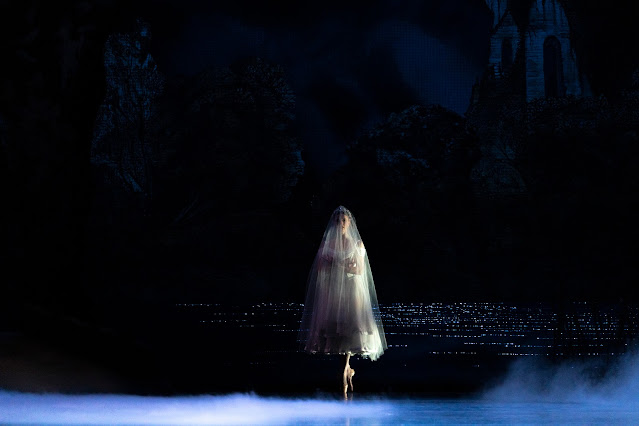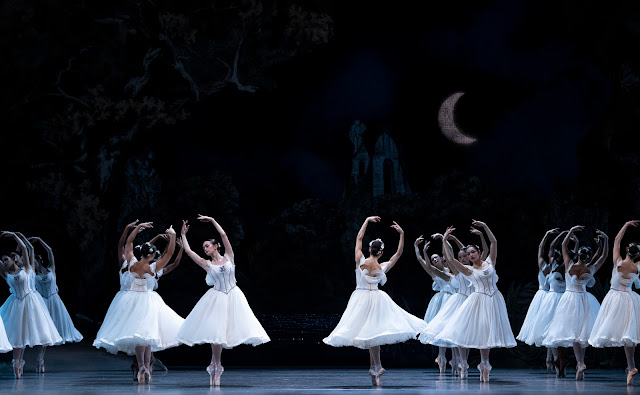Pacific Northwest Ballet's Giselle is a wonderfully Feminist, Goth, Revenge Fantasy! And One of my Favorites!
Pacific Northwest Ballet principal dancer Elle Macy as Myrtha, Queen of the Wilis, makes her first ghostly appearance in Peter Boal’s staging of Giselle. PNB presents Giselle February 3 – 12, 2023, as part of its 50th Anniversary season. (Streaming digitally February 16 - 20.) Photo © Angela Sterling.
Lately,
like a lot of us in the past few years, I have spent a great deal of time
thinking about reality and, especially the realities of life and death—you know, the big
things. The questions that we all ask;
in sum, the questions that keep us awake at night, which haunt our dreaming and
waking moments. Interestingly, a couple
of days ago, in the middle of an average, run-of-the-mill conversation, my
brother looked me, directly in my hazel orange/green eyes and asked, “Xavier—are you
afraid of death?”
I
took a deep breath.
Now,
what would, under normal circumstances have been a difficult enough question to
answer, has become an even bigger, more complex nexus of questions all tied
together with those terrible sailor knots that are designed to give
way under no circumstances. This past year, for me in specific,
has been crazy--with the kinds of changes that leave the really deep wounds. Starting with the end
of a relationship that meant much more to me than I had even understood--or had allowed my heart to believe, from the
death of my father on the “Ides of March,” up to and even including the current depressing battle between artists
and AI bots. A question that is causing
a lot of anguish in the artistic community, raising the validity of what we do
and questioning the very nature of creativity and whether writing a few
sentences and then thinking you’re an artist is anything more valid than a kid
putting a quarter into a gum-ball machine and calling that his “artistic
process.” It has, indeed, been a year
full of extremely difficult questions and seeing my father's “slack-jaw”
moments after passing away, has haunted me ever since and has led me to ask myself
that very same question, “Xavier—are you afraid of death?” And more
specifically, “Are you afraid of dying?”
Fast
forward to last Friday, at McCaw Hall where I was in the audience for what I had
expected to be just “another narrative ballet,” but which deals with some of those big issues and which also includes what for me was one of
the most frightening and moving deaths in ballet and a second act straight out of a Bauhaus concert! Now, don’t get me wrong, I have always loved
losing myself in the absolute verisimilitude of the proscenium experience—be
that theatre, ballet, opera or my personal favourite--Performance art. I love that space in which reality and
theatre collide. That moment when the
“Real,” Reality and fantasy meet.
Imagine something akin to that instant when Pinocchio comes to life,
where he is neither a fully carved-out piece of wood, nor is he yet fully a
boy. It is also, that moment where in
our own biologies, we each go from being an inanimate collection of cells into beings of cognition—a process I imagine goes away just as suddenly in a
singular moment of reverse when we shuffle off this mortal coil and we are left
slack-jawed and silent.
Pacific Northwest Ballet company dancers as the ghostly Wilis, in Peter Boal’s staging of Giselle. PNB presents Giselle February 3 – 12, 2023, as part of its 50th Anniversary season. (Streaming digitally February 16 - 20.) Photo © Angela Sterling.
It
is that shift into unreality, or rather that uncanny moment of indiscernibility
that draws me to the theater, to ballet and in fact draws me to all the arts. It isn’t about figuring it all out—it is not
that misguided misapprehension which throws so many people into the nasty, little,
frustrated, cognitive dissonant position of not being able to figure things out
and thinking that’s what it’s all about.
The great secret of all art is that it is about tripping that up. It is about engendering a situation, idea or
object that is bigger than the sum of its parts. That is why AI will only ever be AI—why it will
never be about anything more—because it needs to be able to stand outside of
itself—it needs to taste the air around its one dimensional pixelated
prison. And perhaps, that is its
ultimate tragedy—for now. It needs to,
and cannot be able to have that moment of sudden self-realization.
But
let’s return to the reason for the season and the moment of transcendence that
makes Giselle into something that is larger than the sum of its parts. It is a moment that at least for now we have
defined as being purely human—a definition which is currently narrow-mindedly,
jingoist and based on the fear of the unknown and the perceived threat that AI
harbors and which occupies far too much space in our supposedly non-AI,
post-primate brains. Perhaps that will change and AI will become just another minority group--time will tell.
I
guess, ultimately, really, if I am honest, though, after last Friday’s opening night at
the Pacific Northwest Ballet’s Giselle originally titled Giselle, ou les Wilis (Giselle, or The Wilis,) my post-primate brain can no
longer really say that I am not a fan of classic, narrative ballet. After, pretty much swooning over Swan
Lake, giving in to Midsummer Night’s Dream, waking up to Sleeping
Beauty and even sharing an apple or two with Snow White—all have tugged
at my heart-strings and become favorites. But for a Goth-at-heart reviewer like myself, Giselle
after a pretty bumpy start is nearly perfect—well, not nearly perfect—we’ll
talk about that whole first act, which, well, just doesn’t match up to the
magic of the second half of this amazing ballet.
Pacific Northwest Ballet principal dancers James Kirby Rogers and Lesley Rausch, in Peter Boal’s staging of Giselle. PNB presents Giselle February 3 – 12, 2023, as part of its 50th Anniversary season. (Streaming digitally February 16 - 20.) Photo © Angela Sterling.
PNB’s casting is just amazing and as the
complex and tragic Giselle, as always, Leslie
Rauch brings us a performance that easily melds acting and dance, power and
sensitive subtlety. In the second act
Rauch is equally matched by Elle Macy
as Myrtha, the Queen of the Wilis. Giselle really is a ballet that features and
celebrates women’s power and these two female leads simply and absolutely steal
the show. Sadly, however, the men in this—as men, sometimes are in real life,
are presented as not much more than stereotypes and plot contrivances—so when Giselle,
the play suddenly switches into my new favorite niche genre(not so new,
actually since this play, as others have pointed out, may actually be the
oldest in PNB’s repertory,)—that is the "gothic, female, zombie revenge ballet"—it is
amazingly satisfying to watch all these lying, cheating, self-serving, rotten
little men get their come-uppances—even the supposed hero is a lying, jerk. Did
I mention that I have always been a bit of a closeted “pro-feminist male?” Well, now you know! Not that I think that it’s ever been much of
a secret.
So, as I was saying before, I may have a new
favorite ballet and quite possibly a new favorite sub-genre within ballet’s
many forms and story-telling tropes. But
before we delve in too deep into the many things that are amazing, within the
play, let’s talk about some of the things that are not so amazing. Basically,
ignore all but the last dance of the first act—its pretty much garbage. You have to know Giselle’s sign language
to understand the goings and comings of the narrative. Sure, all stories need to set up, and Giselle
is no different, but as a ballet, it has one big hurdle to overcome, the
opening murder-mystery is amazingly basic—even boring, the first act is just
getting us to the second half, where everything cool happens and where we get a
strong case of the Wilis—and I can’t really say that it does that terribly well. To top things off, the choreography in the
first act is almost entirely absent replaced by mime and the most condescending
line dancing—which I believe was meant to highlight the rustic simplism of the
town-folk and to create a counterbalance to their upper-class visitors and the
male villains of the piece.
In the end, Giselle is about justice and especially about justice against men who break the hearts of the women that they profess to love. To that end the second half of the play is an amazingly, stark, beautiful tragedy, where no one gets out completely undamaged. The “Wilis” in Giselle that take over the second half of the play getting revenge on one of Giselle’s suitors and nearly killing the hero are meant to be seen as the ghostly spirits of now dead women who were left on their wedding day and who now seek revenge against those that do the same to the women in their lives—trifling with their hearts. These demonic zombies force men to dance to their deaths and we even see Albert, played impeccably by James Kirby Rogers dance to the point of near exhaustion as the Wilis exact their revenge, while Giselle asks for understanding since he wasn't as bad as all that!
My favorite scene in this ballet and one that creates a great moment of
heightened break between what has happened before in the ballet and what goes
on after is the Giselle death dance. This scene is amazing and
powerful and Rausch’s interpretation of the moment in which Giselle goes mad is
one of the most haunting moments that I have ever experienced in live
performance—not just ballet, but any live performance. That moment as she looks right out at the
audience, eyes full of madness and the realization that this is the end—is an
amazing moment that I can picture in my mind as I write this and it sets the gothic tone for the rest of the ballet.
What follows is only let down
by the music that never quite lives up to the visuals and story that we are
presented with. As I sat there, I
couldn’t help think of what it might have been like had the music been done by
Peter Murphy, Andrew Eldritch or even Angelo Badalamenti—God rest his
soul. These scenes, in fact, all of the
last act is presented to us in “Haunted Mansion” green tones, filled with
simple, yet effective, old-theatre “dark house” special effects and are the things
that the “Goths” of the 19th century must have had to inspire their
nightmares and midnight “séances.” It was lovely and I truly enjoyed slipping
into a kind of retro-goth space, pretending to have been of a time when I had not seen quite so much and was not quite so jaded.
In the here and
now, ultimately, however, I find myself asking the same question. “Am I afraid of
Dying? Am I afraid of death? To be completely honest it all just seems
like a terrible waste of information—all those memories, all those events and
stories lost in an instant. I used to think
that death was reserved for the very old or the very infirm—that death had its
own protective coating. But when my
father passed, except for the actual event, he was pretty aware. That’s how I want to go, fully aware and present. To be completely honest—if my dad could do
it, it must not be that hard. But as far
as actually being afraid—I’m really just not sure.
Pacific Northwest Ballet principal dancers Lesley Rausch and James Kirby Rogers with company dancers in Peter Boal’s staging of Giselle. PNB presents Giselle February 3 – 12, 2023, as part of its 50th Anniversary season. (Streaming digitally February 16 - 20.) Photo © Angela Sterling.








Comments
Post a Comment